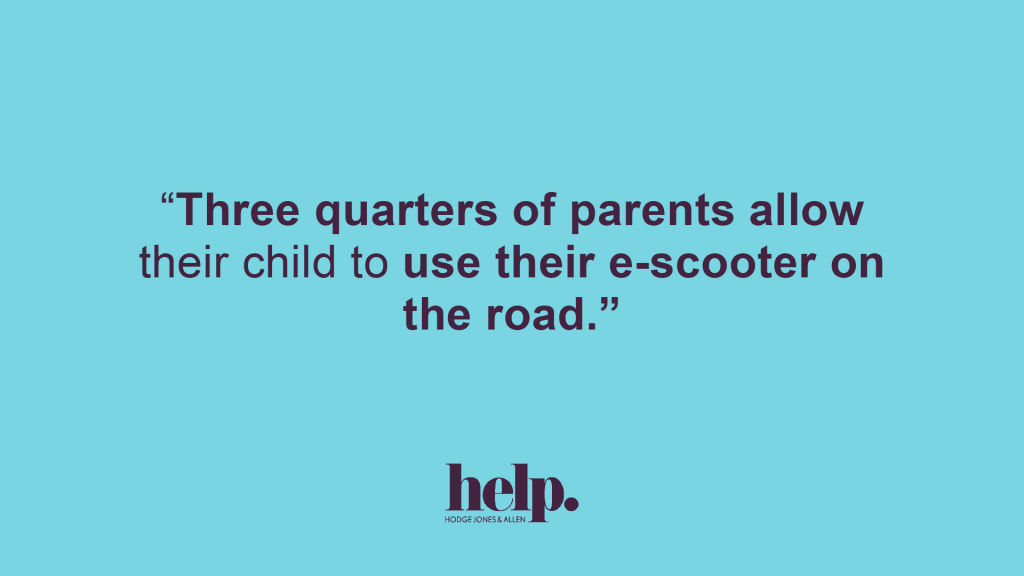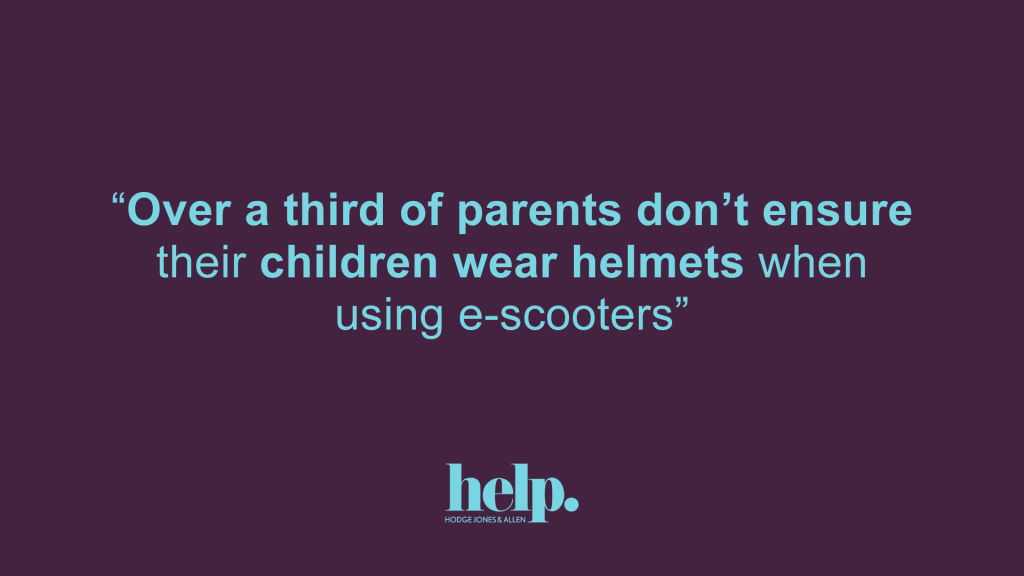Survey Reveals Many Parents Unaware Of Safety And Legal Issues Surrounding Electric Scooters
Spotting an e-scooter is becoming increasingly common across the UK, and they’re a popular item for parents to purchase for their children. This comes as no surprise with Amazon having 5,000 listings when you search for ‘children’s e-scooter’. However, e-scooters bring safety concerns and legal challenges, which shouldn’t be ignored. We wanted to find out more about the use of e-scooters among children, and how much parents are aware of the risks, so we have undertaken new research.
In December 2021, we surveyed 2,000 UK adults with children under 18 years of age1, to find out how well parents know the law surrounding e-scooters, how many parents have bought their child an e-scooter and what they do to ensure their child is safe while riding an e-scooter.
The purchase of e-scooters is on the rise
A recent report from Halfords2 shows the rise of e-scooter sales with the revenue from e-bikes, e-scooters and accessories rising by 140% compared to 2020.
We found in our research that a quarter of UK parents have bought their child an e-scooter.
Nearly half (44%) of parents with children aged between 5-10 years old have bought their child an e-scooter, while this reduces slightly to four in ten (39%) for children aged between 10-15 years old.
Over a quarter (28%) of parents with children under the age of five have bought their child an e-scooter, despite these being able to hit dangerous speeds. The risks of e-scooters are evident, you need at least a provisional driving licence to hire an e-scooter and you can only apply for a provisional licence when you are 15 years and 9 months old3.
London (35%), Manchester (32%) and Newcastle (28%) are the most popular UK cities for parents to buy their child an e-scooter. In contrast, in Edinburgh one in 10 children have been bought an e-scooter and as few as 6% of parents in Belfast have purchased an e-scooter for their child.
E-scooters can only be used on private land
It is increasingly likely that you will spot an e-scooter when you are out in public, yet under current UK law it is illegal to use a privately owned e-scooter on public roads, pavements, and cycle paths.
Privately owned e-scooters are restricted for use on private land only with permission from the landowner.
Despite the UK law, our research has found that 85% of parents who have purchased an e-scooter for their children allow them to use it on public areas. Surprisingly, only one in four parents (27%) agree that children shouldn’t use e-scooters on the road.

Parents ignoring important safety advice
Safety is extremely important for riders of e-scooters and pedestrians, with the ‘powered transporters’ able to hit speeds in excess of 30mph. The latest government data indicated in 2020 there were 484 casualties in accidents involving e-scooters, 384 of these being the riders themselves4.
Unfortunately, one of the 484 casualties resulted in a fatality and our best estimate after adjusting for changes in reporting from the Police is that 128 casualties were seriously injured and 355 slightly injured due to e-scooter accidents in 2020.
While it is apparent that e-scooters can cause serious injuries, shockingly not all parents insist their children use the advised safety equipment while using them. Over a third of parents (38%) don’t ensure their child is wearing a helmet when riding an e-scooter and nearly half of parents (47%) with a child under five are happy to see them ride without a helmet.

Lisa Turan, Chief Executive of the Child Brain Injury Trust, has helped us to highlight and explain the dangers of allowing children to use e-scooters, especially without sufficient safety equipment. She said:
“While high-speed road traffic collisions can certainly be catastrophic, many people don’t realize that average speed, non-motorway crashes can also have devastating consequences, even at 30mph or less. According to the parliamentary advisory council for transport safety (Pacts), there were almost 300 recorded injury-collisions involving private e-scooters in 2021 (does not include near-misses and collisions in which no injuries were sustained) and at least nine people are known to have died in crashes involving e-scooters. According to the Metropolitan Police, within the first 6 months of 2022 there were 258 reported collisions involving e-scooters. NHS trauma specialists cited in a recent Pacts report that they were now treating more and more e-scooter riders, many with “life changing head injuries” (24 Dec 2021).
“Head injuries that affect the brain can be categorised as mild, moderate, or severe, with most brain injuries falling under mild – moderate. After a brain injury, children can go on to have life changing difficulties with memory, fatigue, behaviour, sleep, and cognition, affecting education, work, and relationships, and can lead to the development of poor mental health if left unsupported.
“It is concerning that although wearing a safety helmet is a legal requirement for moped and motorcycle riders, it is not a legal requirement for e-scooter users, yet e-scooters fall under the same laws as other motor vehicles.
“The Child Brain Injury Trust is aware that the Government is considering the possibility of legalising e-scooters on UK roads as part of the ‘Future of Mobility: Urban Strategy’, published in March 2019 and is committed to conduct a regulatory review of micromobility in the UK. As such, the Child Brain Injury Trust would strongly recommend a full and thorough assessment of the safety risks of all e-scooter use, and the introduction of mandatory helmet wearing for e-scooter users.”
Regional data on e-scooters and wearing helmets
The analysis showed the top 15 cities in the UK where parents allow children to use an e-scooter without a helmet:
- Newcastle (45%)
- Manchester (43%)
- Birmingham (42%)
- Sheffield (41%)
- Leeds (41%)
- Nottingham (40%)
- Norwich (39%)
- Edinburgh (38%)
- London (38%)
- Cardiff (35%)
- Southampton (35%)
- Glasgow (34%)
- Liverpool (30%)
- Belfast (28%)
- Bristol (22%)
An e-scooter rider owes a duty of care to pedestrians, cyclists and other road users. Insurance is not compulsory for electric scooters and so with that may come legal issues to deal with and injuries requiring treatment and the need to make a personal injury claim.
Methodology & Sources
1) Survey of 2,000 UK adults who have children under the age of 18. Data collected in December 2021.
2) https://www.halfordscompany.com/media/2968/halfords-group-plc-fy22-interim-results-announcement.pdf)



